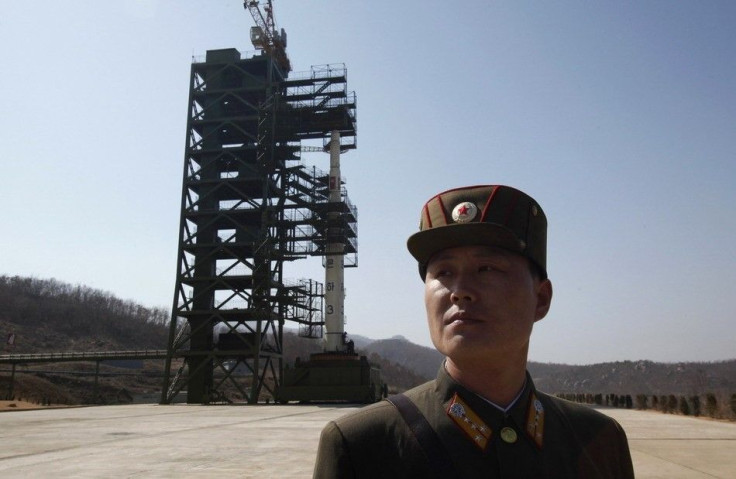North Korean Rocket Launch Called Humiliating Flop

North Korea launched its long-awaited rocket Friday morning, but it fell apart within minutes, two U.S. officials told CNN.
The rocket managed to fly for 75 miles before breaking up into four pieces and crashing into waters off the west coast of the Korean peninsula, a defense ministry source in Toyko said, according to Japanese broadcaster NHK.
South Korea's army said debris crashed into the sea some 130 miles off the western coast of South Korea.
South Korean and U.S. intelligence understand that North Korea's missile launch failed, a spokesman for the South's defense ministry told reporters at a briefing.
Earlier, Japanese Defense Minister Naoki Tanaka said it fell into the sea after a minute.
No piece of the rocket reached space, a U.S. official told CNN, basing the conclusion on data collected by the United States from its first few moments aloft.
The failure of the rocket, which North Korea said would put a weather satellite into orbit, comes as a huge embarrassment amid the buildup for massive celebrations Sunday marking the 100th anniversary of the birth of the North's founder, Kim Il-sung.
North Korean officials had no immediate comment for the foreign journalists invited to Pyongyang for the launch, the Christian Science Monitior reported, while North Korean TV broadcast video footage of scenes from the life of Kim Il-sung, who led the country for nearly 50 years before dying in 1994.
North Korean officials said they'd make an announcement about the launch soon.
The White House released a statement saying, Despite the failure of its attempted missile launch, North Korea's provocative action threatens regional security, violates international law and contravenes its own recent commitments.
President Barack Obama has been prepared to engage with North Korea in a constructive manner, the statement said, but he also insists that the country live up to its earlier commitments and international obligations.
This was supposed to be associated with (Kim Jong Un's) ascension to power. So for this thing to fail ... is incredibly embarrassing, said Victor Cha, former director of Asian affairs for the U.S. National Security Council and now a Georgetown University professor.
The launch occurred at 7:39 a.m. Friday, both Yonhap and YTN reported, citing South Korean officials.
Immediately afterward, the South Korean military dispatched helicopters and ships in an attempt to find debris related to the rocket launch, according to YTN.
North Korea had said the Unha, or Galaxy rocket, would fly southward, carrying its Kwangmyongsong-3 communications satellite, and insisted the launch was for peaceful purposes.
South Korea, Japan and the Philippines, the countries near the projected trajectory, were on heightened alert in case the launching went awry and might endanger their citizens or properties, the New York Times reported. Airlines and ships had been ordered to stay away from the rocket's trajectory and the flashdown zones of its debris.
The launch has drawn international criticism and threats to shoot the rocket down as well as sabotaged a food aid deal with the United States.
The Unha-3 rocket took off from a new launch site on the west coast of North Korea, near the Chinese border, and had it been successful would have enhanced Pyongyang's ability to build an intercontinental ballistic missile capable of delivering a nuclear warhead.
The three-stage rocket's flight path was to take it over the sea between the Korean peninsula and China, where the first stage was due to splash down. A second stage was due to land in waters off the Philippines.
Earlier Thursday, United Nations Secretary-General Ban Ki-moon sternly rebuked North Korea for its planned rocket satellite launch.
I only hope that [North Korean] authorities will heed the calls of the international community. It is clearly a violation of Security Council Resolution 1874, Ban said in Geneva, according to Reuters.
A major question remains whether the North Korean rocket was indeed carrying a satellite. U.S. and South Korean officials believe the satellite claim was false and that the firing was to test the rocket's ability to carry a warhead as far as the U.S. West Coast.
© Copyright IBTimes 2024. All rights reserved.





















